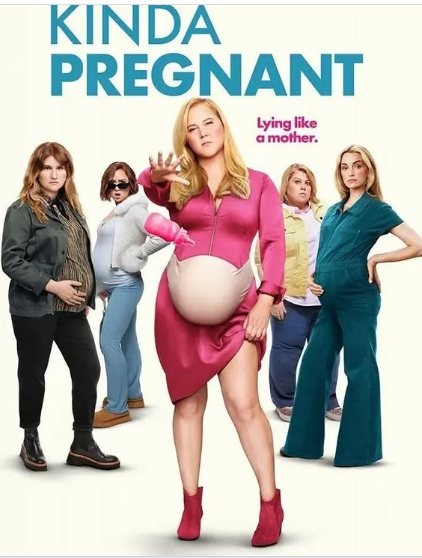By Breanna Tillie
Movies often provide a sort of escapism through thrilling amusement, action and entertainment. The temporary disconnect from reality through cinema can be a satisfying retreat. However, it is also worth noticing the way that many films seek to not just pull viewers away from their reality, but to offer a commentary on it. Films that open up the floor for discussion about culture, popular philosophies and societal issues are intriguing. When a film is able to do this as a romantic comedy rather than a heavy drama, the movie is not just intriguing, it is worthy of a standing ovation. Amy Schumer’s newest romcom, Kinda Pregnant, released through Netflix on Feb.5, does just this.
Although this movie progressed into being a phenomenal work, it began on a bit of an awkward note. The movie follows a common romcom movie opening theme where the protagonist, Lainy, is expecting her boyfriend to propose to her. When he does not do this, there are several cringeworthy and cheesy scenes depicting Lainy’s spiral into lunacy after having her heart broken. Though these scenes are obviously present for comedic effect, it plays on the poor and overused portrayal of a man having the power to break a woman so badly that she loses her mind. Thankfully, the movie improves drastically after this.
Lainy’s best friend then announces that she’s pregnant. This brings up surprising feelings of envy within Lainy as she believes that her clock is ticking and she should already be at that stage in life where she is married and having a baby as well. This does a brilliant job of introducing and displaying a common sentiment about women in their thirties and forties. Lainy has a respectable career as a schoolteacher. For a man, having a respected career is often more than enough to grant him acceptance in society. For a woman however, that may be perceived as not being enough. If a woman is not fulfilling those roles of wife and mother, both requiring male participation, she may feel inadequate.
Interestingly, although the film does display a handful of rude remarks from others, nobody puts Lainy down more for where she is in life than she does herself. She first does this by buying a false baby bump. When she puts the bump on, she receives a congratulatory applause from strangers passing by, and she relishes in the attention and the way she is praised by society because they believe she’s carrying a child. The adoration motivates her to continue wearing the false bump. This brings up another critical cultural point for discussion. Why does a woman’s ability or willingness to carry a child make her worthy of celebration? Is a woman’s worth not much more than this?
Lainy eventually befriends a woman who really is pregnant, and this woman finds strength in confiding in Lainy about the struggles of pregnancy and motherhood that she feels like she’s not allowed to discuss. It is commendable that the movie included this, as it raises another question of why women are expected to enjoy every aspect of being a mom and are shamed for ever complaining.
The movie displays scenes where Lainy is vulnerable about not having family and how the baby gave her that sense of family, even though the baby never existed. When her best friend got pregnant, Lainy was worried she would lose the closest thing she ever had to family. By pretending to be pregnant, she coped with the fear by pretending she was starting a family of her own. It is brilliant that the movie displays how bad decisions are often made out of fear and insecurity rather than malice or stupidity. This is an empowering film about self-worth and how the most important relationships we have are with ourselves.
You may also like
-
Lady Gaga’s “Mayhem” Fails to Disappoint
-
Crossroads Live Delivers a Phenomenal Production of Dear Evan Hansen in Columbus
-
UWG Theatre Breathes New Life into a Beloved Classic
-
QSA Annual Drag Show Entertains Eager, Diverse Crowd
-
Lucy Dacus’ Fourth Studio Album, Forever Is A Feeling, Encapsulates The Vulnerability and Thrill of Falling In Love
